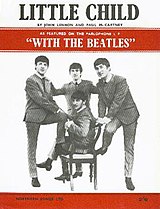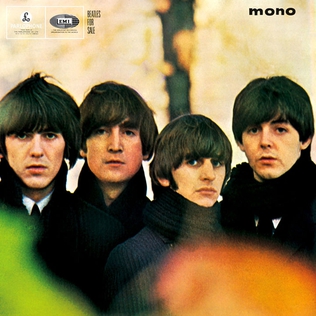
Beatles for Sale is the fourth studio album by the English rock band the Beatles. It was released on 4 December 1964 in the United Kingdom on EMI's Parlophone label. The album marked a departure from the upbeat tone that had characterised the Beatles' previous work, partly due to the band's exhaustion after a series of tours that had established them as a worldwide phenomenon in 1964. Beatles for Sale was not widely available in the US until 1987, when the Beatles' catalogue was standardised for release on CD. Instead, eight of the album's fourteen tracks appeared on Capitol Records' concurrent release, Beatles '65, issued in North America only.
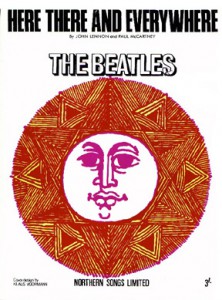
"Here, There and Everywhere" is a song by the English rock band the Beatles from their 1966 album Revolver. A love ballad, it was written by Paul McCartney and credited to Lennon–McCartney. McCartney includes it among his personal favourites of the songs he has written. In 2000, Mojo ranked it 4th in the magazine's list of the greatest songs of all time.
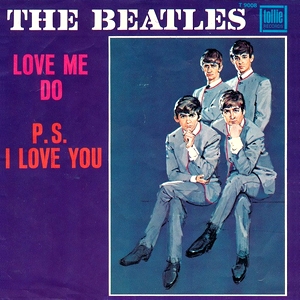
"Love Me Do" is the debut single by the English rock band the Beatles, backed by "P.S. I Love You". When the single was originally released in the United Kingdom on 5 October 1962, it peaked at number 17. It was released in the United States in 1964 and topped the nation's song chart. Re-released in 1982 as part of EMI's Beatles 20th anniversary, it re-entered the UK charts and peaked at number 4. "Love Me Do" also topped the charts in Australia and New Zealand.

"You Won't See Me" is a song by the English rock band the Beatles from their 1965 album Rubber Soul. It was written by Paul McCartney and credited to Lennon–McCartney. As with songs such as "We Can Work It Out" and "I'm Looking Through You" from the same period, the lyrics address McCartney's troubled relationship with Jane Asher and her desire to pursue her career as a stage and film actress. The Beatles recorded the song during what author Mark Lewisohn describes as a "marathon" final recording session for Rubber Soul, to ensure the album's pre-Christmas release.
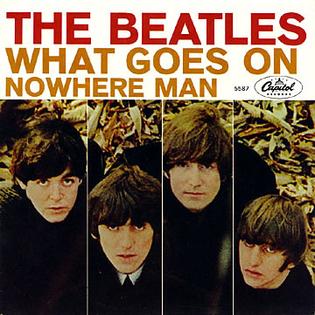
"What Goes On" is a song by the English rock band the Beatles, featured as the eighth track on their 1965 album Rubber Soul. The song was later released as the B-side of the US single "Nowhere Man", and then as the tenth track on the North America-only album Yesterday and Today. It is the only song by the band credited to Lennon–McCartney–Starkey and the only song on Rubber Soul that features Ringo Starr on lead vocals. The song reached number 81 on the US Billboard Hot 100 in 1966.
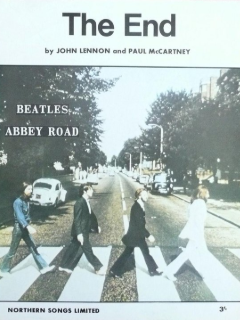
"The End" is a song by the English rock band the Beatles from their 1969 album Abbey Road. It was composed by Paul McCartney and credited to Lennon–McCartney. It was the last song recorded collectively by all four Beatles, and is the final song of the medley that constitutes the majority of side two of the album. The song features the only drum solo recorded by Ringo Starr with the Beatles.

"Thank You Girl" is a song recorded by the English rock band the Beatles, written by John Lennon and Paul McCartney. It was issued as the B-side of the single "From Me to You", which was recorded on the same day. While not released on an LP in the United Kingdom until Rarities in 1978, the song was the second track on The Beatles' Second Album in the United States. As the B-side of the single "Do You Want to Know a Secret", it hit No. 35 on the Billboard Hot 100 in the spring of 1964.
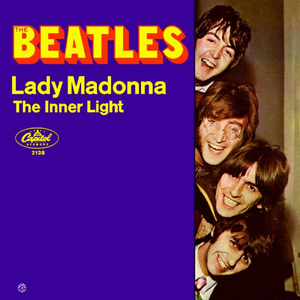
"Lady Madonna" is a song by the English rock band the Beatles, written primarily by Paul McCartney and credited to Lennon–McCartney. In March 1968 it was released as a mono non-album single, backed with "The Inner Light". The song was recorded on 3 and 6 February 1968, before the Beatles left for India, and its boogie-woogie style signalled a more conventional approach to writing and recording for the group following the psychedelic experimentation of the previous two years.

"The Continuing Story of Bungalow Bill" is a song written by John Lennon, and released by the English rock band the Beatles on their 1968 double album The Beatles. The song was recorded at EMI Studios on 8 October 1968 and was completed the same day. The group also started and completed the Lennon-composed "I'm So Tired" during the same recording session. Along with Lennon, the song also contains co-lead vocals by Yoko Ono, the only song recorded by the group to feature lead vocals by a non-member.
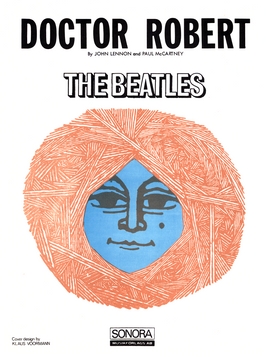
"Doctor Robert" is a song by the English rock band the Beatles. It was released in 1966 on their album Revolver, apart from in North America, where it instead appeared on their Yesterday and Today album. The song was written by John Lennon, although Paul McCartney has said that he co-wrote it. The Beatles recorded the track in seven takes on 17 April 1966, with vocals overdubbed on 19 April.

"Baby's in Black" is a song by the English rock band the Beatles, co-written by John Lennon and Paul McCartney. It appears on the United Kingdom album Beatles for Sale and on the United States album Beatles '65, both released in 1964.
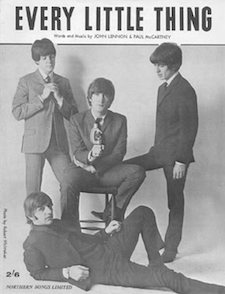
"Every Little Thing" is a song by the English rock band the Beatles from their album Beatles for Sale, issued in the UK in December 1964. Credited to Lennon–McCartney, it was written by Paul McCartney. Capitol Records first issued the song in the US on Beatles VI in June 1965. The track is an early example of the Beatles' use of non-rock instrumentation on a recording, through the addition of timpani drum over the choruses.
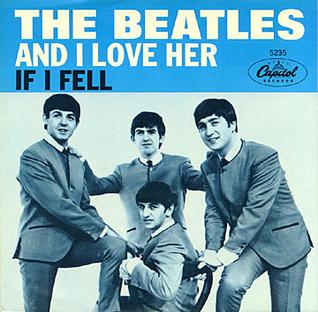
"And I Love Her" is a song recorded by English rock band the Beatles, written primarily by Paul McCartney and credited to the Lennon–McCartney partnership. It is the fifth track of their third UK album A Hard Day's Night and was released 20 July 1964, along with "If I Fell", as a single release by Capitol Records in the United States, reaching No. 12 on the Billboard Hot 100.

"All I've Got to Do" is a song written by John Lennon and performed by the English rock band the Beatles on their second British album, With the Beatles (1963). In the United States, "All I've Got to Do" originally appeared on Meet the Beatles! (1964). According to Dennis Alstrand, the song is the first time in rock and roll or rock music in which the bass player plays chords as a vital part of the song.

"Misery" is a song by the English rock band the Beatles from their 1963 debut album Please Please Me. It was co-written by John Lennon and Paul McCartney. According to Lennon, "It was kind of a John song more than a Paul song, but it was written together." McCartney was to say: "I don't think either one of us dominated on that one, it was just a hacking job."
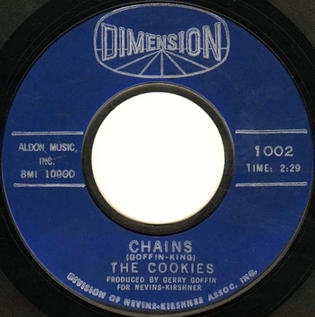
"Chains" is a rhythm and blues song written by husband-and-wife songwriting team Gerry Goffin and Carole King. It was a hit for the American girl group the Cookies in 1962 and for the English rock band the Beatles, who recorded the song for their debut album in 1963. King recorded a solo version of "Chains" for her 1980 album Pearls: Songs of Goffin and King.

"I Call Your Name" is a song recorded by the English rock band the Beatles and credited to Lennon–McCartney. It was written primarily by John Lennon, with assistance from Paul McCartney. It was released in the US on The Beatles' Second Album on 10 April 1964 and in the UK on the Long Tall Sally EP on 19 June 1964. On 7 March 1988, the song appeared on Past Masters, a compilation album that includes every song commercially released by the band that was neither included on the 12 UK studio albums nor the US Magical Mystery Tour LP, meaning that "I Call Your Name" appeared for the first time on a core catalogue album.

"I'm a Loser" is a song by the English rock band the Beatles, originally released on Beatles for Sale in the United Kingdom, later released on Beatles '65 in the United States, both in 1964. Written by John Lennon, and credited to Lennon–McCartney, it was considered for release as a single until Lennon wrote "I Feel Fine".

"Dig It" is a song by the English rock band the Beatles from their 1970 album Let It Be. The song is credited to Lennon/McCartney/Harrison/Starkey, and is one of the few songs to be credited to all of the Beatles. This song and the 39-second "Maggie Mae" appear on the Let It Be album, but are excluded from the Let It Be... Naked album, instead being replaced with "Don't Let Me Down". Glyn Johns' May 1969 version of the album, then titled Get Back, had a four-minute excerpt of "Dig It", which was later reduced to the much shorter version in the final album.
"If You've Got Trouble" is a song written by Lennon–McCartney and recorded by the Beatles on 18 February 1965 with Ringo Starr singing the lead vocal. The song was intended to be Starr's vocal appearance on the Help! album and the Help! film, but the Beatles were not happy with the recording and later chose to record "Act Naturally" instead. "If You've Got Trouble" remained unreleased until Anthology 2 in 1996.
